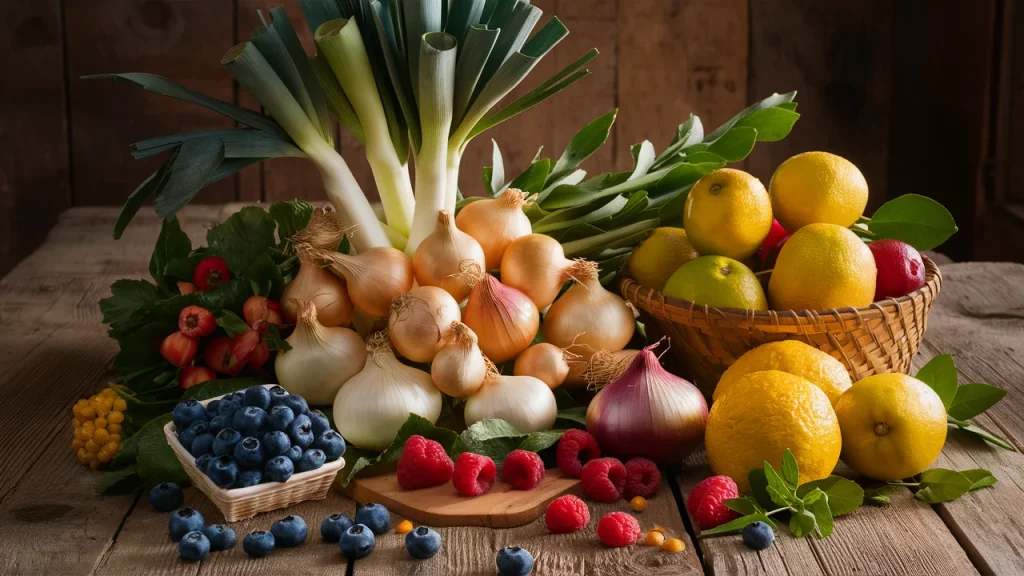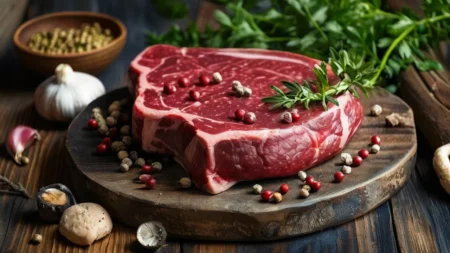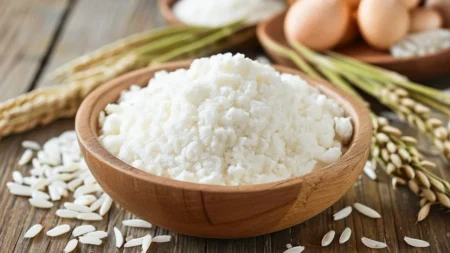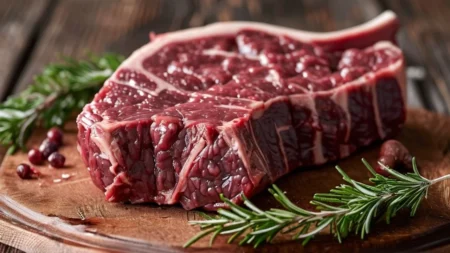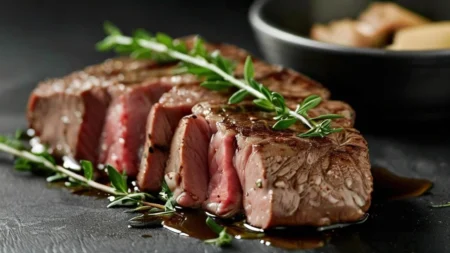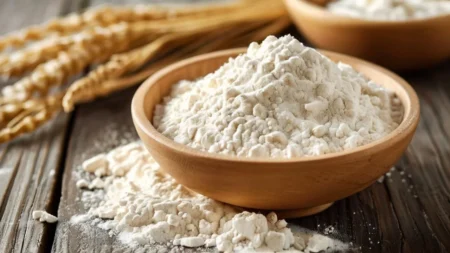Quercetin is a powerful bioflavonoid found in a variety of fruits, vegetables, and other plant-based foods. As a potent antioxidant and anti-inflammatory agent, quercetin has been the subject of extensive research for its potential health benefits. This article will explore the nature of quercetin, its sources, the various ways it may support overall health, and any potential side effects or precautions to consider.
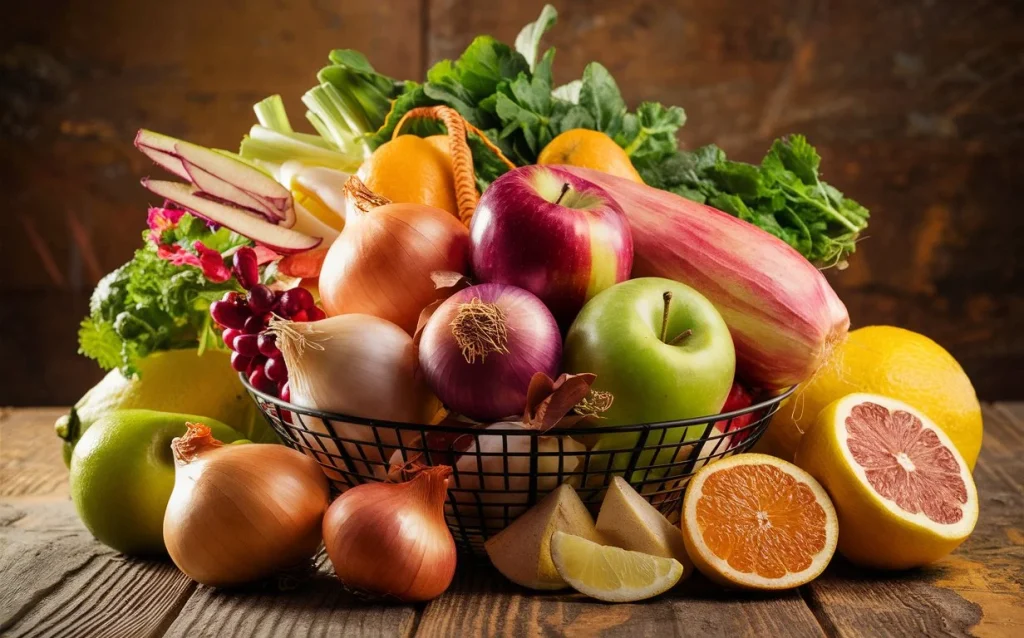
Key Takeaways
- Quercetin is a potent antioxidant and anti-inflammatory compound found in many plant-based foods.
- Quercetin may offer cardiovascular health support, immune system benefits, and potential cancer-fighting abilities.
- Common dietary sources of quercetin include onions, apples, berries, green tea, and red wine.
- Quercetin supplements are also available for those seeking to increase their quercetin intake.
- Potential side effects and precautions include medication interactions and allergic reactions.
What is Quercetin?
Quercetin is a remarkable flavonoid, a type of plant pigment that belongs to the broader category of polyphenols. As a bioflavonoid, quercetin is responsible for the vibrant colors found in a wide array of fruits, vegetables, and other plant-based foods.
Understanding Quercetin as a Flavonoid
Flavonoids, such as quercetin, are a diverse group of natural compounds found in plants. These plant pigments play a crucial role in the visual appeal and health benefits of various plant-based foods. Quercetin, in particular, is known for its potent antioxidant and anti-inflammatory properties.
The Role of Quercetin in Plants
Within the plant kingdom, quercetin serves a vital function. It helps to protect plants from various environmental stressors, such as ultraviolet radiation, pathogens, and herbivores. By contributing to the vibrant colors of flowers, fruits, and leaves, quercetin also plays a role in attracting pollinators and seed dispersers, which are essential for the plant’s reproductive success.
Quercetin: A Potent Antioxidant
Quercetin is widely recognized as a powerful antioxidant, capable of neutralizing harmful free radicals and protecting cells from the damaging effects of oxidative stress. This unique property of quercetin is believed to be a key factor in its potential to support overall health and well-being.
Neutralizing Free Radicals
Free radicals are unstable molecules that can cause cellular damage and contribute to the development of various health issues. Quercetin, with its remarkable antioxidant capacity, is able to scavenge and neutralize these free radicals, effectively reducing the burden of oxidative stress on the body.
Boosting Overall Health
By mitigating the harmful effects of free radicals and oxidative stress, quercetin may play a pivotal role in supporting overall health and well-being. Emerging research suggests that this potent antioxidant may contribute to the maintenance of a strong immune system, cardiovascular function, and even potentially reducing the risk of certain types of cancer.
Health Benefits of Quercetin
In addition to its powerful antioxidant properties, quercetin has been extensively studied for its potential therapeutic benefits, particularly in the areas of anti-inflammation, cardiovascular health support, and cancer prevention.
Anti-Inflammatory Properties
Quercetin is known for its impressive anti-inflammatory abilities. As an anti-inflammatory agent, quercetin can help reduce inflammation by inhibiting the production of inflammatory mediators, such as cytokines and prostaglandins. This makes it a promising natural remedy for conditions characterized by chronic inflammation, including arthritis, asthma, and certain autoimmune disorders.
Cardiovascular Health Support
Numerous studies have investigated the potential of quercetin to support cardiovascular health. Quercetin’s antioxidant and anti-inflammatory properties may help improve endothelial function, reduce blood pressure, and lower the risk of atherosclerosis, ultimately contributing to a healthier cardiovascular system.
Potential Cancer-Fighting Abilities
Emerging research suggests that quercetin may possess cancer-fighting properties. Quercetin has been shown to inhibit the growth and proliferation of certain cancer cells, as well as induce apoptosis (programmed cell death) in cancer cells. While more research is needed, these findings indicate that quercetin may have the potential to play a role in cancer prevention and management.
In addition to these well-studied health benefits, quercetin has also been linked to improved immune support and potential allergy relief, making it a versatile and intriguing natural compound worth further exploration.
Sources of Quercetin
Quercetin, the renowned bioflavonoid, can be found in a variety of plant-based food sources as well as in the form of dietary supplements. Understanding the different ways to incorporate quercetin into your daily routine can help you maximize the potential health benefits it offers.
Quercetin-Rich Foods
Quercetin is naturally abundant in a number of common fruits and vegetables, making it easy to incorporate into a healthy diet. Some of the top quercetin-rich food sources include onions, apples, berries, green tea, and red wine. By enjoying these nutrient-dense foods, you can boost your quercetin intake and take advantage of its potent antioxidant and anti-inflammatory properties.
Quercetin Supplements
For those seeking to increase their quercetin intake beyond what can be obtained from diet alone, quercetin supplements offer a convenient option. These supplements are derived from various plant sources and are available in a variety of forms, such as capsules, tablets, or powders. Consulting with a healthcare professional can help determine the appropriate dosage and ensure the safe use of quercetin supplements, especially for individuals with specific health conditions or who are taking other medications.
| Quercetin-Rich Food Sources | Quercetin Content |
|---|---|
| Onions | Approximately 0.3-1.4 mg/g of fresh weight |
| Apples | Approximately 2-8 mg per medium-sized apple |
| Berries (e.g., blueberries, raspberries, blackberries) | Ranging from 2-15 mg per 100g of fresh weight |
| Green tea | Approximately 10-25 mg per 8-ounce serving |
| Red wine | Approximately 3-16 mg per 5-ounce serving |
Potential Side Effects and Precautions
While quercetin is generally considered safe when consumed in food sources, the use of quercetin supplements may carry some potential risks and precautions that should be considered. Individuals taking certain medications or those with specific allergies or sensitivities may need to exercise caution when incorporating quercetin supplements into their regimen.
Interactions with Medications
Quercetin has the potential to interact with various medications, including blood thinners, immunosuppressants, and certain types of cancer treatments. It is crucial to consult with a healthcare professional before taking quercetin supplements, especially for those individuals who are already taking prescription medications. Proper dosage and timing may be necessary to minimize any potential interactions.
Allergic Reactions and Sensitivities
In rare cases, some individuals may experience allergic reactions or sensitivities to quercetin. Symptoms may include skin rashes, hives, or digestive discomfort. Those with known allergies to bioflavonoids or related compounds should exercise caution and consult with a healthcare provider before incorporating quercetin into their diet or supplement regimen.
Conclusion
In conclusion, quercetin is a versatile and well-studied bioflavonoid that has garnered significant attention for its potential health benefits. As a potent antioxidant and anti-inflammatory agent, quercetin may support cardiovascular health, immune function, and even potentially reduce the risk of certain types of cancer.
The research on quercetin has been promising, with studies suggesting that this remarkable plant pigment may offer a wide range of protective and restorative properties. From its ability to neutralize harmful free radicals to its potential in supporting heart health and immune function, quercetin has emerged as a compelling natural solution worth further exploration.
Whether obtained through a diet rich in quercetin-containing foods or through supplementation, this bioflavonoid presents an exciting opportunity for individuals seeking to optimize their overall well-being and potentially mitigate the risk of various health concerns. As the scientific community continues to unravel the nuances of quercetin‘s mechanisms and applications, the future holds promise for even more impactful discoveries.
FAQ
What is quercetin?
Quercetin is a flavonoid, a type of plant pigment that belongs to the broader category of polyphenols. It is responsible for the vibrant colors found in many fruits, vegetables, and other plant-based foods.
How does quercetin function as an antioxidant?
Quercetin is widely recognized as a potent antioxidant, meaning it can help neutralize harmful free radicals and protect cells from oxidative stress. This property of quercetin is believed to be a key factor in its potential health benefits.
What are the health benefits of quercetin?
In addition to its antioxidant capabilities, quercetin has been studied for its potential health benefits, particularly its anti-inflammatory properties, cardiovascular support, and possible cancer-fighting abilities.
Where can I find sources of quercetin?
Quercetin is found naturally in a variety of plant-based foods, such as onions, apples, berries, green tea, and red wine. It is also available as a dietary supplement for those who wish to increase their quercetin intake.
Are there any potential side effects or precautions with quercetin?
While quercetin is generally considered safe when consumed in food sources, the use of quercetin supplements may carry some potential risks and precautions, such as interactions with certain medications and the possibility of allergic reactions or sensitivities.





